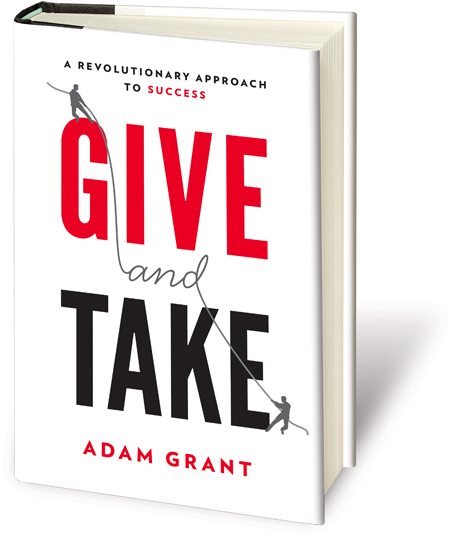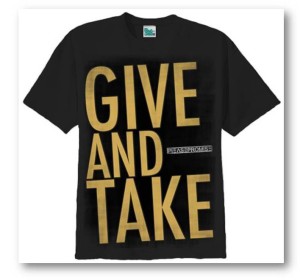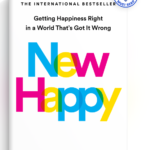How often each day are you taking from others without reciprocating? Or, are you in constant mode of giving help 24/7? Adam Grant’s brilliant new book called Give and Take is an exceptional well researched book outlining the way that being a giver can influence your life. Like Youngme Moon, Dan Ariely and Daniel Pink, this is another important marketing thought leader with some great insights.
Grant describes three types of people. Givers, Takers and those in between that he calls Matchers.
Grant describes three types of people. Givers, Takers and those in between that he calls Matchers.
The givers are those who are always helping others to connect, to get information and to mentor. They aren’t looking for anything in return but believe that this is how they want to be in the world. When a giver meets someone new, she tries to find a way to help expand the new acquaintances’ network. Without asking for something in return, she selfishly gives her time.
 The takers are those at the other extreme who want to get something from others to help themselves. They aren’t looking for reciprocity but are only looking out for themselves. Takers tend to have big networks too but in part they are often burning bridges and need to keep finding new connections. They live in a ‘leaky bucket’ kind of world. They are only in it for themselves. Their interest is singular – what can you do for me?
The takers are those at the other extreme who want to get something from others to help themselves. They aren’t looking for reciprocity but are only looking out for themselves. Takers tend to have big networks too but in part they are often burning bridges and need to keep finding new connections. They live in a ‘leaky bucket’ kind of world. They are only in it for themselves. Their interest is singular – what can you do for me? In the middle are these matchers who I like to describe as the Quid Pro Quos- you do this for me and I’ll do that for you. Matchers say, “I can help you connect with this important person but in return, what can you do for me?” They see the world as an exchange of favors and need to even out the giving and taking.
Surprising Results
Givers tend to be over represented at the bottom of the pack in many industries according to Grant. By bottom of the pack he means in terms of their successful careers. But his findings also show that givers also are over represented at the top too. It seems that givers can find themselves so absorb with helping others all the time that they don’t act in their own short term benefit. However, in the long run they tend to be the ones who people come back to with opportunities. Givers benefit the most in the long term.
The book is rich with research and real world examples like Frank Lloyd Wright, Jonas Salk and even an accounting professor at UNC and Duke named CJ Skender who has successfully taught over 35,000 students. One of my favorite stories is about what Grant calls powerless communications which has to do with humility as a tool for being heard.
To learn more about the book and Grant who teaches at my alma mater, check out this video on YouTube about his thesis. Very entertaining.
Marketing Strategies Today
What intrigued me about the book was thinking about the marketing profession and how important being a giver is today in the social media world. If you aren’t putting out 25 gifts to your community (on Twitter, Facebook, Linkedin and other social media sites) versus the 1 ask that you make, you may be acting against your best interest. Giving and being generous is a marketing strategy that most successful marketing professionals I know follow. Those at the top of their game tend to intuitively know that freely giving is the best default setting.
Try this little experiment this month:
Track how often someone asks for a favor and keep track of your response. Do you act without asking for something in return or are you just purely giving? Monitor what you do online if it’s a give or a take or somewhere in the middle.
How often do you ask followers to do something for you versus doing something for them like provide interesting articles, links or podcasts.
Identify coworkers who fit into one of these two categories and observe their behavior and how they act when requests come to them.
Are you a giver, a taker or a matcher?
Note: When I am not trying to unravel the mysteries of marketing, you will find me trying to help others as a giver. It was how I was raised, it is in my DNA and it is how I want to be in the world. Can I be of help to you?






